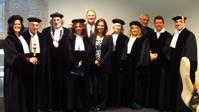Stephen Shimshock
DISSERTATION TITLE:
Open Source Evaluation: Transforming the Evaluator and the Evaluand from Roles to Participatory Actions
This dissertation has two distinct purposes. The first is to explore the principles behind self-organization as seen in open source software projects and other types of Internet based mass- collaboration such as Wikipedia. It is important to note that the focus is not on the technological tools these projects employ but rather the organizational principles guiding the output of these projects. The term “open source” is widely used to describe decentralized practices in which participants have open access to the source materials used for development and production. These practices are transforming the ways we think about information, organization, and the delineation of power within roles such as producer and consumer. There are some clear linkages and similarities between the organizing principles found in these Internet based collaboration projects and the general principles seen in various perspectives of social construction. If the organizing principles at work in these projects are not inextricably linked to the technological infrastructure can they be extracted and applied in non-technical environments? The second purpose of this dissertation is to provide a case study as an answer to that question. The case study highlights the development and implementation of a participatory evaluation project with a collaborative group of public and private agencies in Boise, Idaho that serve youth aging out of the foster care system. The project was developed utilizing the concepts gleaned from Internet based forms of organization and social construction viewpoints. The aim of the project is to build (in an open source fashion) an evaluation project from the ground up.

- Dissertation Table of Contents (85.79 KB)
- Dissertation Abstract (71.54 KB)
- Dissertation (2.14 MB)


